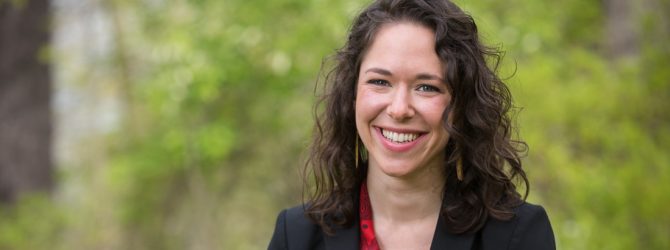Jessica Sokolow graduated from CIPA in May of 2017 with a concentration in International Development. She is currently working as a Consultant at Cabrera Research Lab.
Why CIPA? There are a lot of MPA programs around—what made you choose CIPA over other programs you were considering?
I initially made the decision to go back to graduate school because I decided I wanted to shift my career path from drinking-water policy to food and agriculture policy. Due to Cornell’s global reputation on issues pertaining to food and agriculture, in conjunction with the flexibility of the program to shape your degree, I knew the CIPA program was right for me.
What are your long-term career goals? How did CIPA help prepare you for these?
In the near and long-term, I am interested in designing progressive policies and programs to address sustainability issues at the nexus of health and the environment. Whether I will be in the public, private or non-profit sector, I want to work for organizations that address these issues in a multi-disciplinary way and use innovative, systems-based approaches. Through my coursework and hands-on opportunities across the Cornell campus, I gained experience and knowledge across disciplines, which expanded my perspective on different ways to address complex sustainability issues. These perspectives are the most critical piece I gained from my education at CIPA and will allow me to critically think about, and work to address, the complex problems facing our world today through evidence-based policies and programs.
What would you tell a prospective student who asked you to list the top three reasons that CIPA was a good fit for you?
- It’s flexible. I could design my degree, under advisement by my advisor, with the courses that would prepare me to work on complex sustainability issues, particularly pertaining to food and agriculture.
- One critically important piece of the puzzle I was looking for in my graduate education was a diverse student body. The CIPA experience is shaped by the diverse cohort of students. I knew that my graduate education—more so than the faculty—would be impacted by formal and informal discussions with colleagues. As CIPA students come from all over the world, and are greatly diverse in their ages, religions, etc., you end up learning an enormous amount from your friends and classmates.
- Hands-on learning experience. There are a variety of opportunities within CIPA and across campus to gain hands-on experiences that informs your perspective and prepares you for a career after CIPA.
Are there any particular “stand out” experiences at CIPA that made a lasting impact on you?
The Cornell in Rome off-campus study program, which was a driving factor in my decision to choose CIPA in the first place, became a stand out experience for me. The program allows you to spend a semester in Rome, taking a graduate course while completing an externship. I worked for Bioversity International, an international research institution that is a part of the CGIAR (Consultative Group for International Agricultural Research) system. As part of their Healthy Diets from Sustainable Food Systems Initiative I worked with technical experts across disciplines—from nutrition to agronomy—to research and write about issues related to biodiversity and nutrition, as well as multifunctional landscapes and seascapes. During my externship, I learned an enormous amount from my colleagues and through my research. I also had the unique opportunity of being published on several papers and book chapters, positioning me well for other opportunities at CIPA and beyond.
Following my internship, I had the opportunity to stay abroad for my summer internship with the Tata-Cornell Institute for Agriculture and Nutrition (or TCI). Through this experience, I had the opportunity to spend seven weeks conducting independent research in India on gender empowerment. I spent most of my time in Baghmundi, West Bengal, a 19-hour train/car ride from Delhi. There, with assistance from a translator, I interviewed women of different castes, ages and experiences about their process of transformation after joining a women’s self-help group. This experience was truly transformative in the way that it expanded my perspective on issues pertaining to international development, as well as in the research and communication skills I quickly strengthened during my brief, but intensive field research.
Finally, during my last semester at CIPA I participated in the Sustainable Global Enterprise program with the Cornell SC Johnson College of Business. This program was yet another opportunity to get hands-on experiences. During the SGE program, you spend the semester engaging in a consulting project on a topic pertaining to sustainability with a group of business students. While I had spent time prior to CIPA doing consulting, this program was an opportunity to specifically learn how to address complex issues pertaining to sustainability from the business perspective. This experience was one of the most important I had at Cornell, as it added a range of business tools/skills/perspectives to my toolbox, preparing me for work on a number of issues across sectors.
How would you describe the sense of community you find at CIPA?
CIPA is a unique community of passionate current and future change-makers with a diversity of perspectives and experiences. CIPA students truly care about and support each other. The guidance and support you find within the CIPA community among fellows, staff and faculty was instrumental to my success at CIPA, and I predict it will continue to be critical throughout my future experiences.

